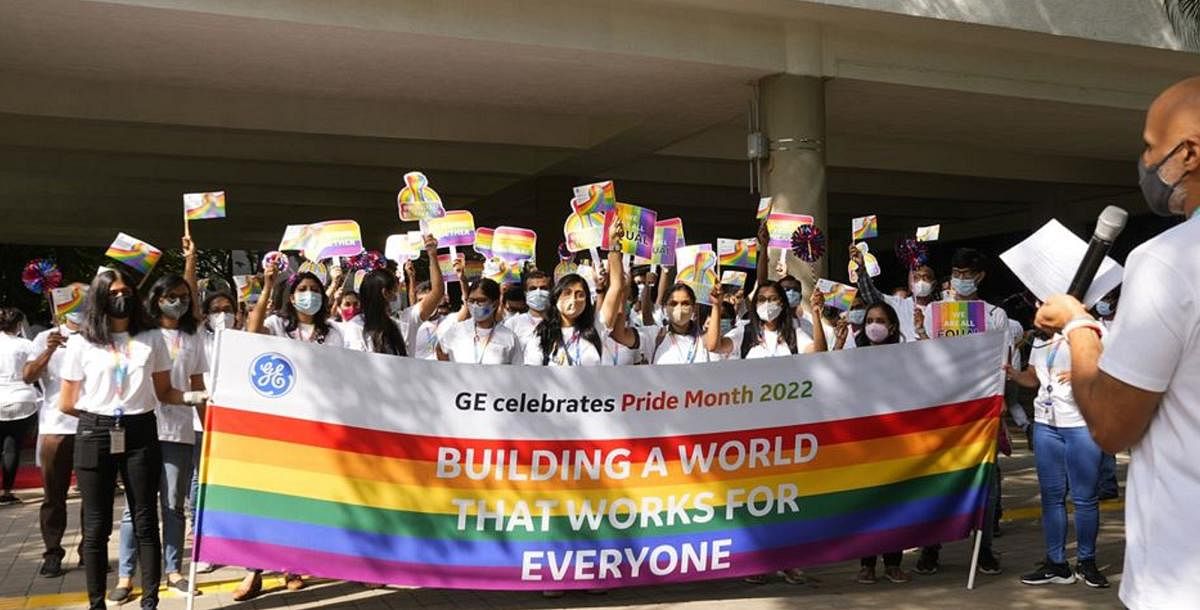
Companies in Bengaluru are increasingly hiring people from the LGBTQIA+ community. From introducing new policies to adding gender-neutral facilities, they are going all out to take the inclusive route.
Aditya Khanna, operations manager at Amazon India, was pleasantly surprised when he was told at the hiring stage that the company focused on diversity, equity and inclusion (DEI).
A member of the queer community, he joined the company four years ago. With 16 years of experience, he was open about his sexual orientation with his earlier employers, and had always had “a mixed bag or negative experiences”.
Like Aditya, many members of the queer community seek inclusiveness at companies.
Companies are now offering insurance coverage for same gender partners and gender reassignment surgery. They also provide leave and counselling, and hold awareness sessions.
Amazon India also offers the option for queer employees to sign up for infertility treatment under their insurance scheme. Access to counsellors and gender-neutral restrooms are other initiatives.
Swati Rustagi, director of DEI, international markets, Amazon India, says, “Among many affinity groups within Amazon, Glamazon is focused on the LGBTQIA+ community, and it helps bring LGBTQIA+ employees, associates, and allies together to discuss and share experiences from across the globe.”
The Lalit Suri Hospitality Group, which owns The Lalit Ashok, started their #PureLove campaign in 2016, which is “about welcoming people from all walks of life”.
Akshay Tyagi, corporate manager-DEI, says, “We have about 15 people from the queer spectrum working with the Bengaluru team, and have trained over 2,500 individuals across our locations.”
At applied technology services company Mphasis, recruitment drives focused on diversity happen throughout the year, says Dnyan Shah, senior vice president and global head, human resources. “Our policies include gender-neutral adoption policies where all employees wanting to adopt a child are eligible for 12 weeks of work from home. Anyone undergoing a gender reassignment surgery gets up to 30 days leave,” Shah adds.
About 400 employees took part in a pride walk held at the GE Technology campus in Whitefield earlier this month. Sukla Chandra, senior managing director, licensing and inclusion and diversity leader, GE South Asia, says initiatives to support the community include sensitisation.
“The transgender employee protection policy here ensures amenities including gender-neutral restrooms. Our centre at Whitefield is equipped with such washrooms on each floor,” she says.
Changing names
Prachi Rastogi, diversity and inclusion leader-IBM (Asia Pacific), says employees can display, from 2019, their pronouns on their profiles in the company’s global intranet employee directory.
“Not all transpersons and non-binary employees are able to change their legal name, so the company updated its internal systems in 2021 to offer its employees the option to use their chosen name as default,” she says.
‘More opportunities’
The Pride Circle, a diversity and inclusion organisation, hosted a job fair at Bengaluru in 2019 and later editions online.
Ramkrishna Sinha, co-founder, says, “We saw an increased interest from employers in IT and banking, financial services and insurance companies.”
The 2018 ruling in the Supreme Court, decriminalising homosexual activity, definitely encouraged this, he says.
“We have helped around 300 companies across the country with policies and culture and leadership on allyship,” he adds. The company has also helped 500 members of the queer community get placements. “Around 35 percent of this was from Bengaluru,” he says.
Nirmala Menon, founder of Interweave Consulting, an organisation that provides diversity and inclusion training services, observes that there is a sharp increase in Bengaluru companies hiring LGBTQIA+ individuals.
Nirmala analyses existing policies at companies and helps to make them “more inclusive”.
“Awareness used to be more in the IT and banking sector, but there is an increased awareness across industries now. Also more companies now observe Pride Month,” says Nirmala.
Monster.com launched a digital campaign called #ComeOutAsAlly, which saw 400-plus netizens openly coming out as allies to encourage safe and inclusive workspaces for the LGBTQIA+ community.
Sekhar Garisa, CEO, says that workshops help build an equitable professional environment. “We have started ‘Embrace’, an employee sensitisation workshop,” he says.